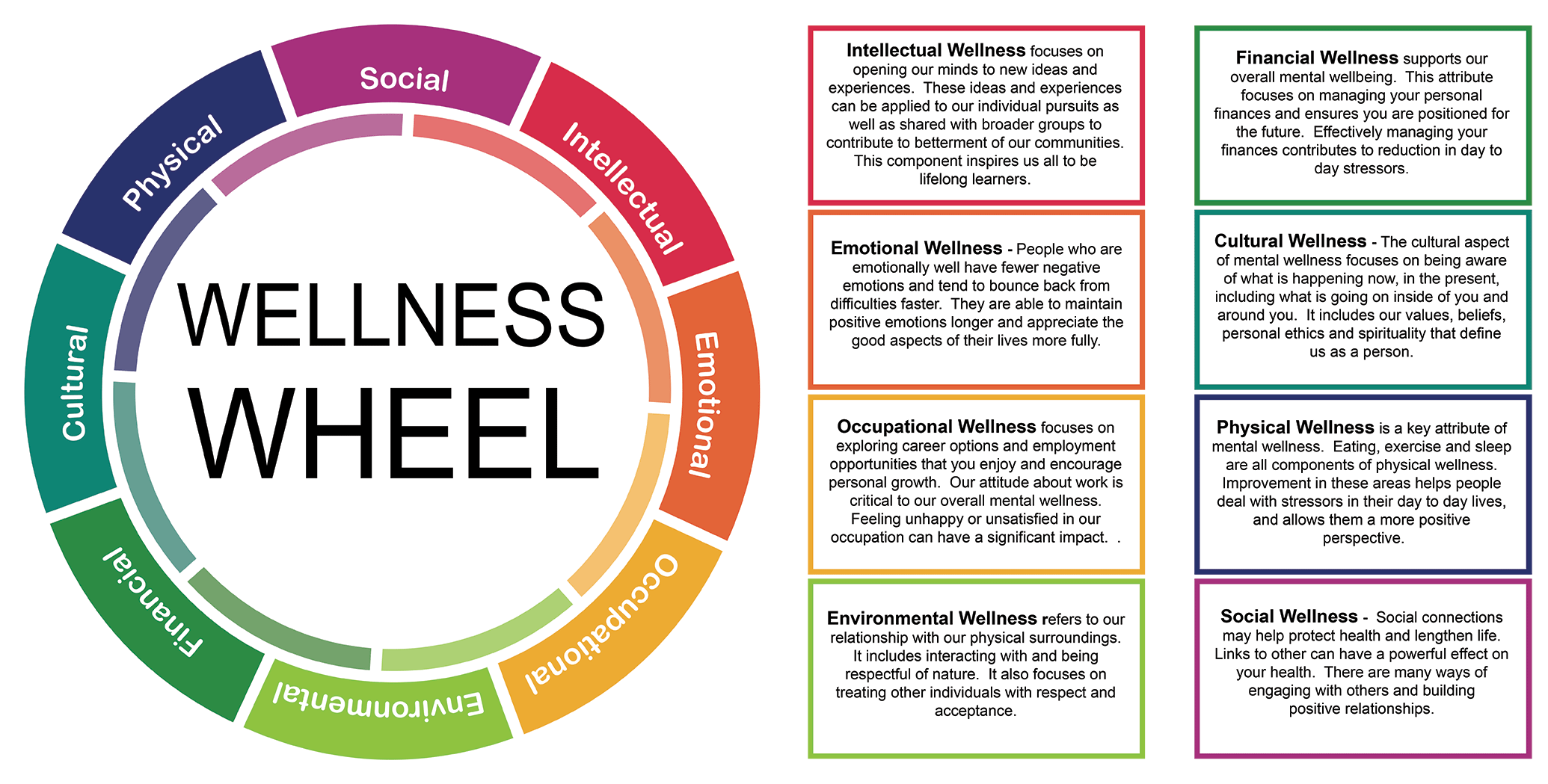

Mental wellness is the ability to successfully handle life’s stresses and adapt to change and difficult times. A person that fits the definition of mental wellness has a positive sense of wellbeing and hope, despite daily stressors and challenges. Overall, mental health wellness depends on factors, like self-acceptance, autonomy, quality of relationships, capacity for personal growth, and overall life satisfaction.
Achieving and maintaining mental health wellness requires focused effort. It is a skill to learn how to maintain mental health, and it may be more challenging for some than for others. Each person’s journey toward mental health wellness will be different, depending on his or her needs, lifestyle, and personal goals. The tabs below provide insight into the four key areas of mental wellness.
Additional information for each of the subtopics listed below can be found at:
- https://www.americanmentalwellness.org/
- Emotional Wellness Toolkit | National Institutes of Health (NIH)
- Your Healthiest Self: Wellness Toolkits
- Staying Mentally Healthy | Mental Health America (mhanational.org)
Wellness Wheel
Intellectual wellness focuses on opening our minds to new ideas and experiences. These ideas and experiences can be applied to our individual pursuits as well as shared with broader groups to contribute to betterment of our communities. This component inspires us all to be lifelong learners.
- Take a class to learn something new
- Actively listen and question
- Explore locally and globally to expand your knowledge
- Share knowledge with others
People who are emotionally well have fewer negative emotions and tend to bounce back from difficulties faster. They are able to maintain positive emotions longer and appreciate the good aspects of their lives more fully. Below are some of the attributes of people who are striving for emotional wellness.
- Taking care and valuing yourself--"self-care"
- Setting realistic goals for yourself
- Recognizing and avoiding burnout
- Avoiding perfectionism and self-criticism--allowing yourself to be human
Work life takes up the majority of our awake time each week. Our attitude about work is critical to our overall mental wellness. Feeling unhappy or unsatisfied in our occupation can have a significant impact. Occupational wellness focuses on exploring career options and employment opportunities that you enjoy and encourage personal growth.
- Seek new opportunities if you find yourself unfulfilled or unhappy in your current role
- Strike a balance between work and personal life
- Take a break from the technology that keeps us connected continuously
Environmental wellness refers to our relationship with our physical surroundings. It includes interacting with and being respectful of nature. It also focuses on treating other individuals with respect and acceptance.
- Reduce, reuse and recycle
- Reduce toxins in your home; clean with non-toxic products that are better for your home and the environment
- Engage in outdoor activities; considering the impact on our environment
- Promote diversity and acceptance in our interactions
Financial wellness supports our overall mental wellbeing. This attribute focuses on managing your personal finances and ensures you are positioned for the future. Effectively managing your finances contributes to reduction in day to day stressors. Key steps that you can take:
- Spend less than you make; only borrow what you can afford
- Eliminate debt, especially high interest rate debt (credit cards)
- Establish an emergency savings account for life's unexpected expenses
- Create a savings plan for known future expenses: college, retirement
The cultural aspect of mental wellness focuses on being aware of what is happening now, in the present, including what is going on inside of you and around you. It includes our values, beliefs, personal ethics and spirituality that define us as a person. It also means that you don't operate on autopilot, but instead are aware of your mental state. The items listed below may help you be more mindful or aware.
- Quiet your mind
- Create healthy dreams and aspirations
- Establish a good foundation of morals: behaviors and beliefs
- Find mindfulness resource in your local community--yoga, meditation, stress reduction programs
Physical wellness is a key attribute of mental wellness. Eating, exercise and sleep are all components of physical wellness. Improvement in these areas helps people deal with stressors in their day to day lives, and allows them a more positive perspective.
- Adopt a healthy diet
- Establish a regular exercise routine
- Get quality, restful sleep--limit the use of electronics before going to bed
- Avoidance of alcohol, stimulants and nicotine can aid in more restful sleep
Social connections may help protect health and lengthen life. Links to other can have a powerful effect on your health. There are many ways of engaging with others and building positive relationships. A few are listed below.
- Build a strong support system including family, friends, co-workers
- Promote a positive work or school environment
- Employ gratitude to help strengthen relationships
- Increase awareness of others
- Volunteer in your community
- Join a group focused on a favorite hobby

